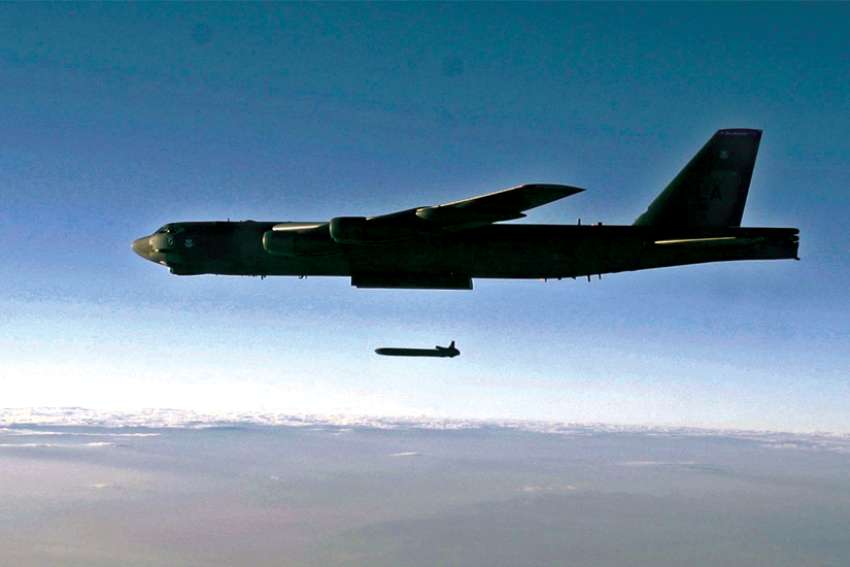Recently, Pope Francis and American Archbishop John Wester courageously expanded and deepened the Catholic peace tradition in historic ways.
For his part, the Pope clearly declared all wars to be unjust. “Wars are always unjust, because the one who pays is the people of God,” he said during a March 16 video conference with Patriarch Kirill, primate of the Russian Orthodox Church. The Pope’s message was in stark contrast to that of the patriarch, who stirred controversy by publicly justifying the Russian invasion of Ukraine.
“There was a time, even in our churches, when people spoke of a holy war or a just war,” Pope Francis noted. “Today we cannot speak in this manner. A Christian awareness of the importance of peace has developed.
“Our hearts cannot help but cry in front of the children, the women killed — all the victims of the war. War is never the way.”
On March 18, Pope Francis expressed a similar view when addressing the International Congress promoted by the Pontifical Foundation Gravissimum Educationis.
“A war is always — always! — the defeat of humanity,” he told the congress. “There is no such thing as a just war. They do not exist!”
For centuries, the Catholic Church outlined strict moral conditions for war — sometimes called the “just war” theory. This teaching long predated the development of weapons of mass destruction, including nuclear, chemical and biological weapons.
On Jan. 11 this year, Archbishop John Wester of Santa Fe, New Mexico, also took bold steps for peace when he issued a pastoral letter entitled, “Living in the Light of Christ’s Peace: A Conversation Toward Nuclear Disarmament.” The archbishop lives “in the belly of the beast” near the Los Alamos National Laboratory. The New Mexico facility played a major role in developing two atomic bombs unleashed by the United States on Japan in August 1945.
Although Canada never possessed nuclear weapons, it played a major role in what was known as the Manhattan Project. In August 1943, Canada hosted a meeting in Quebec City to facilitate an agreement between the U.S. and United Kingdom encouraging development of an atomic bomb.
Canada supplied nuclear research and uranium as fuel for the wartime scheme. For two decades after the war, Canada continued to supply uranium for military purposes.
In his pastoral letter, Archbishop Wester highlights his 2017 visit to Hiroshima and Nagasaki. Forever changed by this sombre experience, he now encourages Christians in his archdiocese and across the U.S. to consider their responsibility as peacemakers.
“We can no longer deny or ignore the dangerous predicament we have created for ourselves with a new nuclear arms race, one that is arguably more dangerous than the past Cold War,” the archbishop writes in the letter’s summary.
“Further, we need to figure out concrete steps toward abolishing nuclear weapons and permanently ending the nuclear threat. If we care about humanity, if we care about our planet, if we care about the God of peace and human conscience, then we must start a public conversation on these urgent questions and find a new path toward nuclear disarmament.”
Archbishop Wester notes that Pope Francis expanded Catholic teaching about nuclear weapons. Although Church teaching long rejected use of nuclear weapons, it allowed for possession of such weapons to deter other states from using their nuclear weapons.
However, Pope Francis has condemned not only the use, but also the possession of nuclear weapons. The Holy See or Vatican was also among the first States to sign the United Nations Treaty on the Prohibition of Nuclear Weapons which entered into force in January 2021.
Like other members of NATO, Canada declines to sign the treaty, instead supporting the retention and potential use of nuclear weapons on its behalf. Many are advocating for Canada to change course to sign and ratify the treaty.
The Catholic peace movement highlights the timeliness of Pope Francis’ plea for all nations to work toward a world without nuclear weapons. Members point to the invasion of Ukraine by Russian President Vladimir Putin and his threat to use nuclear weapons if opposed by NATO.
Worldwide, there are more than 13,000 nuclear weapons. Russia has the largest nuclear arsenal, while the U.S. possesses the second largest. Critics warn of the potential for catastrophic destruction, as well as the risk of accidents and misuse of nuclear weapons.
Archbishop Wester and many others also point to exorbitant costs associated with such weapons. Instead, they advocate for funds to be diverted for peaceful purposes and the common good.
As the archbishop notes, Pope Francis often highlights the nonviolent Jesus who declared peacemakers blessed and taught disciples to love their enemies.
Archbishop Wester invites Christians to walk together toward “a new culture of peace and nonviolence where we all might learn to live in peace as sisters and brothers on this beautiful planet, our common home.”
(Sr. de Robertis is a Sister of Charity of the Immaculate Conception in Saint John, N.B.)


